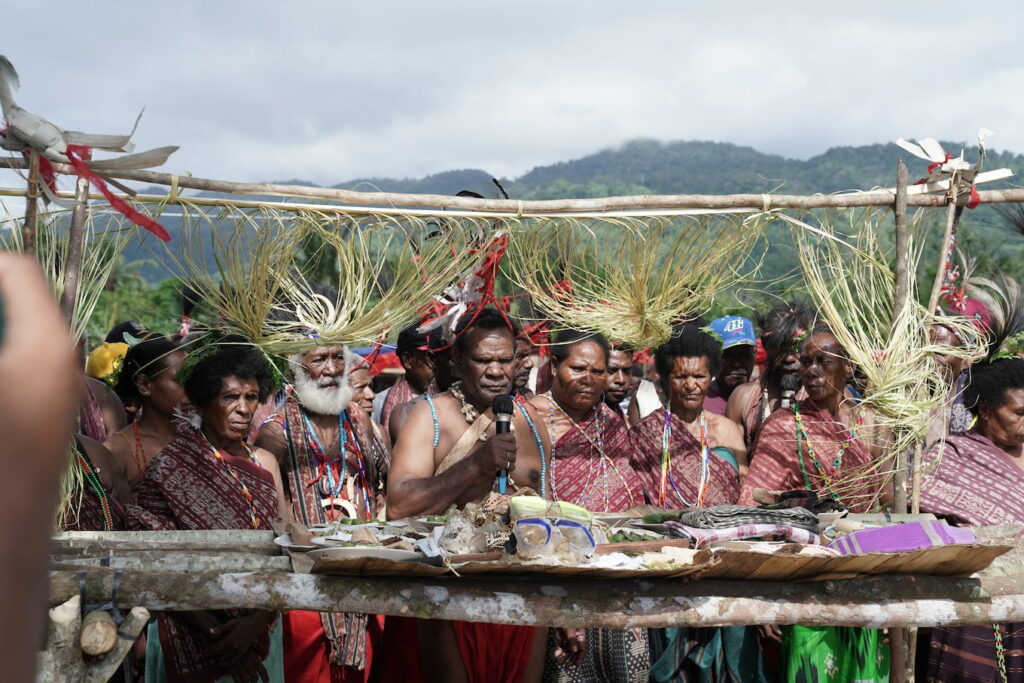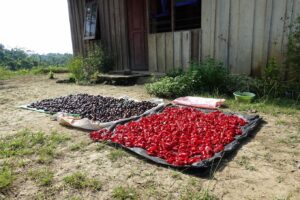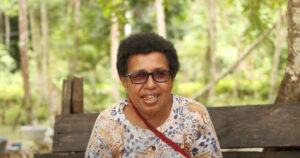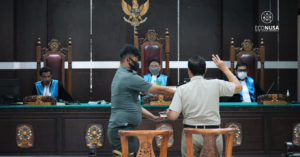
“Everybody please gather at the gate. Let us be prepared for the Egek Festival!,” a young man of Moi Tribe in Malaumkarta Village with a speaker on his hand enthusiastically invited people from his village to join him that morning. He walked around every corner of his village repeating the invite, followed by a shell trumpet blast or also known as kulit bia, as a call sign to all residents. That day, Monday, June 5th, 2023 was the opening day of Egek Festival in Malaumkarta Village, Makbon District, Sorong, Southwest Papua.
A first ever 2023 Egek Festival was initiated by young people of the Moi Tribe that is known as Pemuda Generasi Malaumkarta (Malaumkarta Young Generations). With support from many parties such as national government institutions, district government and other related stakeholders including EcoNusa Foundation, this cultural festival was held on June 5-8, 2023. “Tong Jaga Alam, Wariskan Budaya Egek Suku Moi” (We Protect The Nature, Inherit the Egek Culture of the Moi Tribe) as the slogan of the festival as well as the dates were selected to inline with the World Environment Day celebrations on June 5th every year.
“We, on behalf of the West Papua Provincial government officials, express our support to this festival due to the importance of environmental protections especially on our water ecosystem. Do not let this rich culture of Moi Tribe vanish,” Edison Siagian, Acting Regional Secretary of West Papua Province stated his support at the opening ceremony of the Egek Festival. Edison was also encouraged to put the Moi Tribe local language into the local education curriculum to preserve the language.
Read Also: A Travel Notes: Egek, Traditional Conservation Culture of the Moi Tribe
Egek is the local wisdom of the Moi tribe which regulates the prohibition of extracting natural resources within a certain period of time in certain areas. This tradition was chosen as the name of the festival because it has an important meaning for the Moi people. The essence of egek is to take enough and give pause to nature to recover.
“Egek has high cultural and traditional values of the Moi Tribe that can also generate high potential in the cultural sector. All festivals with sustainability value should be maintained collectively, in order to bring economic benefit to local communities,” Acting Head of District Sorong, Yan Piet Mosso.
All guests of the festival were greeted with a Moi Tribe welcome dance of a’leing dance. All mothers, fathers, young girls and boys of Moi Tribe put on their angsling, a traditional costume made of agmai tree bark, a boat-shaped head accessories of Moi Tribe called woser and other accessories. The elders also carry noken on them and some put a koba-koba (a traditional umbrella), a lemek (a tool to pound sago tree) and other crops they have inside their noken.
After the opening ceremony, a fie ceremony was conducted. Fie was a ritual of Moi Tribe to officially “open” the egek tradition that was led by their customary elders. This ritual was the traditional way of asking for permission from the ancestors to collect marine products and asking for safety for the Moi people who are in charge of diving to collect marine products. In the fie ritual, the customary council prepares several offerings for the ancestors such as areca nut, betel nut, lime, cigarettes, woven cloth, yellow rice, sliced sago, sago dregs, as well as fishing gear such as molo glasses and fishing snares.
Sebagai kearifan lokal, egek adalah kearifan lokal yang memberikan jeda kepada alam untuk beregenerasi. Ini adalah cara masyarakat Kampung Malaumkarta menjaga laut sebagai sumber penghidupan. “Masyarakat semua mata pencahariannya nelayan, dari hasil lautlah kami bisa menghidupi keluarga dan menyekolahkan anak-anak. Jadi torang (kami) sangat bergantung sekali dengan laut. Tong harus jaga alam, agar alam tidak murka,” kata mama Abigail Kalami, salah satu warga asli Malaumkarta.
During the implementation of egek, local Moi people were prohibited to take and consume high numbers of marine products. Some species such as lobsters, lola and sea cucumbers were not allowed to be fished. Only when the egek was opened, these species can be fished but with several conditions, such as no fishing for baby lobsters or female lobsters with eggs must be released back to the sea. These conditions were proposed by local Moi people as their way to preserve the marine resources that can also benefit them. Their tradition also forbids using destructive tools while fishing and punishments will be implemented to everyone that breaks these rules.
Read Also: Travelling while Preserving Cenderawasih Bird
Mama Abigail from Malaumkarta explained that egek is important for them as the heritage and mandate from their ancestors to protect nature. She believes that if nature is not preserved well, mother nature could express its anger with disasters to Moi people. They believe that nature is a given ‘supermarket’ that provides all needs for them, weather in the forests or ocean.
Egek in Malaumkarta is also implemented in forest areas. Some species are not allowed to be hunted during egek, such as kangaroos, birds and reptiles. Moi people in the forest areas can only hunt for a limited amount of wild hogs and deers during egek. Local people are also prohibited from cutting down trees. “If we cut one tree from the forest, we have to plant 10 new trees. This is mandatory to protect our forest,” Mama Abigail continued her story.
Mama Abigail represents the voices of all the Moi people. She hopes that nature in the Land of Papua, from forests, springs, to the sea, can be preserved. Traditions like egek should not only be practiced by people in Malaumkarta, but also by people in other villages in the Land of Papua, even in all over Indonesia. “We live from nature. If nature is damaged, it will directly interfere with the continuation of our life,” Mama Abigail concluded.







